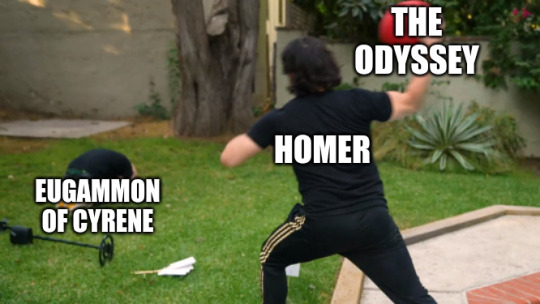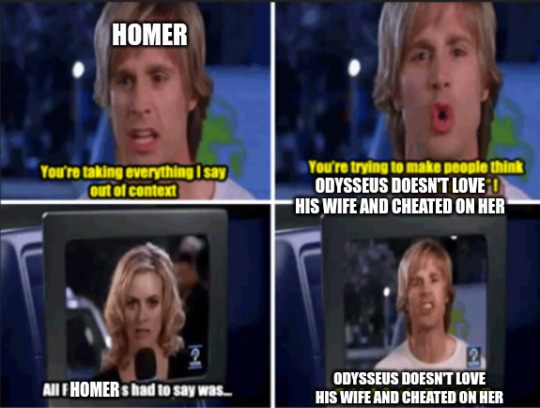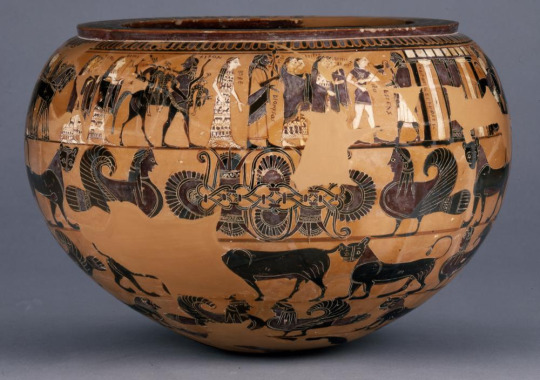#wedding of Thetis
Explore tagged Tumblr posts
Text
Hi. I'm cyberbullying a long dead poet because of his shitty fanfic. Enjoy. I'd love it if you joined me.







(Before you get mad at me, yes, I know Eugammon of Cyrene is an important figure and all that. I'm sick with some sort of flu. Let me cyberbully an ancient dead fanfic writer in peace.)
#I think my favorite is the astronaut one lol#because I wanna see Homer fed up and just start taking people out.#Also Penelope not putting up with some little shit.#You know what? I'm gonna be a bitch to people who bring up Telegonus to me and be like “Oh? You mean Polites' son?👁👁”#just to fuck with people >:)#Can you imagine how confused and mad people would get at me??? I love it.#Eris threw the Golden Apple into Thetis' and Peleus' wedding and I threw this shit into tumblr#guys I'm on weird flu medicine aaaaaaaaaaaaaaaaa#I have not slept much because of it🙃#Mad rambles#am I funny yet?#shot by odysseus#anti circe#anti madeline miller#tele-GONE-y#odysseus#penelope#odyssey#the odyssey#tagamemnon#greek mythology#odypen#greek myth memes#Mad memes#penelope of ithaca
366 notes
·
View notes
Text
SPOTTED
Chaos in couture. The one and only goddess of chaos and discord crashing the most anticipated wedding of the century?
It seems her invite was lost in the wind. You wouldn't have any idea about that, would you, Aeolus?
Color me not surprised.
It must have wounded poor Eris' feelings to be the only Olympian excluded from Peleus and Thetis' nuptials.
My sources tell me that she glided into the hall with a golden apple and a smirk that could launch a thousand ships. She tossed it in the snack in the middle of the dance floor and made her exit - but not without snatching up a goblet of Dionysus' favorite wine.
Zeus' lovely bride Hera snatched it up first. "To the fairest." Athena whispered as she read the inscription aloud over her shoulder. Of course, Aphrodite snatched it away upon hearing those words. Obviously, it could only be meant for her. It certainly isn't for Athena.
Gods, that’s a recipe for disaster. Who needs an invite when you can toss over the entertainment?
Choose carefully, Zeus.
Peace and blessings to the happy couple,
Cyrena~

#greek mythology#capstone project#spill the tea#eris goddess of discord#chaos#tagammemnon#wedding of peleus and Thetis#Zeus#Aphrodite#Athena#hera#trojan war#apple of discord#golden apple#to the fairest#gossip
32 notes
·
View notes
Text
Recently read a really fantastic fic on Ao3 by the very talented @hellokittysasuke (Link can be found here - do check it out if you're interested in an exploration of Apollo and his many griefs) and one of the things they mentioned in their wonderful reply to my extremely long comment has been rolling around in my head a bit.
Specifically, it was about readings of the Iliad where people view Apollo's directing of Paris' arrow as an act of mercy - that it was a rare act of compassion from a god that had been otherwise adversarial to Achilles because he, more than any god or mortal, understood the pain of continuing to live after one's soul has already died. I find this interesting for a myriad of reasons - the fact that Achilles' death is not actually portrayed in the text of the Iliad notwithstanding - but chiefly because, well, put plainly, Apollo despises Achilles. And, even more relevantly, in the context of this fic which deals primarily with Apollo writing a letter to Hyacinthus, I felt like it highlights even more intensely what Apollo despised about Achilles.
In Book 24, when Apollo makes a stand against Achilles' prolonged desecration of Hector's corpse and rights as a warrior, he says:
"But murderous Achilles... that man without a shred of decency in his heart... his temper can never bend and change--/Achilles has lost all pity!... No doubt some mortal has suffered a dearer loss than this, a brother born in the same womb, or even a son... " "The Fates have given mortals hearts that can endure."
Because grief affords lenience - just as wrath, or passion or any other myriad of intense, afflicting emotion but Achilles had lost his humanity in his anger, had lost every human decency and thus had to be hunted like a beast and slain with the arrow instead of the sword. And I think the contrast between Achilles' grieving and the other examples that are presented in the fic - Prometheus' anguish as he's eaten alive, primordial man when they were severed down the middle and left yearning, Apollo who must love and lose in perpetuity - are that they are examples of that human quality of endurance. That yes, things hurt - they might even hurt for thousands of years, but eventually, eventually they will stop hurting. The pain that was endured will be alleviated, it will be a memory, it will be a kindness and it must be accepted just as joy and peace and love are accepted.
Anyway, go read hellokittysasuke's fic, it's really good and I cannot stop thinking about it.
#my very first post about achilles and it's not aggressive#we call that character development#There's a tendency to look at achilles and apollo as contemporaries or foils or parallels and all of that is correct#but I don't think it should ever be forgotten that by the end of things Apollo despised everything about Achilles#It wasn't always like that too - later in that exact book Hera talks about how at Thetis and Peleus' wedding#Apollo had sang about how Achilles would live a long and happy life#I suppose the version of Achilles Apollo had seen was the one where Achilles didn't chase glory#Also the author straight up said that they didn't agree with that interp of Achilles' death btw#the statement itself just got me thinking#ginger chats about greek myths#the iliad#iliad#achilles#apollo#greek mythology#I'm gonna have to do a talking about fic tag at some point because that will absolutely be a thing
21 notes
·
View notes
Text
I have another candidate for who Hera’s favorite kid is. It’s Thetis
#honestly Hera let’s Thetis get away with anything#threw the most lavish wedding ever for her marraige to a mortal#their interactions in the iliad and argonautica mean so much to me#honestly fitting since I view her as closer to her foster mother#that she’d similarly be closer with her foster daughter#hera#Thetis#tagamemnon
16 notes
·
View notes
Text
the wedding of peleus and thetis - dinos by sophilos

basic facts
date - c580-570 bce
style - early black figure
original location - ever so sorry but i have no clue we just know it was made in attica
function - dinos - mixing water and wine
size - 28.8cm tall, 42cm wide/deep
context
similar to perseus and the gorgons ! we're in attica, moving away from the corinthian tradition of decorating using rows of animal processions and floral patterns, and starting to prioritise the attic preferences of narratives - this pot shows the wedding of peleus and thetis! if these guys seem familiar, they should - thetis was a goddess of the sea and the mother of achilles ! it's also good to remember that this wedding is where eris brought the golden apple to start some divine infighting (and also the trojan war).
we know that this pot was painted by sophilos, because he signed the pot - this is the earliest attic potter that we can actually name! he signed "sophilos painted me" between the columns of peleus' house (not in english though !! ancient greeks did not speak modern english).
content
friezes of processing animals - again, we have some corinthian influence with the filling of space done by repeating figures of processing animals. these are less carefully done - the shapes are not quite as regular
floral pattern and animals - he's just not serving as much cunt as the gorgon painter - his floral pattern is less intricate than the one on the perseus+gorgons dinos
narrative frieze - LONG ASS PROCESSION - this shit is SO LONG it goes on forever and ever and ages. lots of gods and godly figures, some chariots.
then we have a cute lil repeating band at the top ! just to finish off the pot - this is also done a little bit haphazardly and there are a few inconsistencies with the incision
list of names to try to remember (as per the british museum):
peleus
dionysos, hebe, cheiron
zeus + hera
poseidon + amphitrite
hermes + apollo
ares + aphrodite
fates + graces + muses
athene + artemis
oceanus + tethys
eileithyia
hephaistos
stylistic features
the procession of gods
there are so many labels - this guy could write and wanted EVERYONE to know
as well as the labels, there is some use of item symbolism to demonstrate which person is which - peleus has a kantharos in his hand, dionysos is carrying a vine rod, etc. however, i'm going to go out on a limb and suggest that the easiest to recognise is cheiron because he has four whole legs (i HATE THEM why does he have two human legs and two horse legs)
hebe is SERVING. she's got the cutest dress ever which is a microcosm of the whole pot with its bands
we do have a little bit of attempt to show 3d concepts - some of the figures overlap, whereas others are in isolation. this adds a bit of variation to the very long line created by the procession
black-figure technique/era - specific points
incision has been used to create patterns and details, like the items that various characters are holding. but, as per early black figure, the lines are jerky and it makes telling what people are holding very difficult.
we have some painting ! there is purple paint on the robes of cheiron and dionysos, white paint on the flesh of hebe (it is important to note that white paint flakes off due to a chemical reaction with the clay !)
again, these guys have no clue what people look like under their clothes - hebe's stripy dress looks like it's still on the hanger because there is absolutely no indication that she is not flat as a board underneath it. similarly, cheiron's robe also looks very very flat. archaic artists just don't really understand how people look under their clothes (see: the sounion kouros - if i had three ribs per side and shoulderblades that were just concave lines i think i would be dead)
it's black-figure, we're going to be complaining about the anatomy. we still have the profile head with the full frontal eye, but we also have very long digits - those fingers and toes are LONG and i don't want them anywhere near me.
composition
decorative friezes
there is some symmetry here - if we take the floral design in the middle as our centre point, there is symmetry in that band, but again, we have a weird disjointed feeling looking down the pot. two rows below this design, the animals have a similar line of symmetry, but the frieze between breaks this vertical line
lots of emphasis on the horizontals - there are a few straight horizonal lines painted, maybe as a guide for the designs, maybe as a conscious decision - the one below the narrative frieze does act as a floor, so that one gets a pass from me
narrative frieze
the use of a procession is so good for a dinos bc it's a long ass space to fill, so what better to fill it in with than a long ass line ?
another time to remind you of hebe's dress - a mini version of the whole pot
lots of repeating shapes due to the monotony of the procession - you might be able to argue that the inverted "v" shape of the legs acts as a jagged-tooth pattern to draw the eye to the labels and heads.
scholarly references
"for the first time we see a long multifigure frieze ... devoted to a single major theme" - boardman
sophilos "liked the written word and made abundant use of it" - woodford
"conventionally and rather carelessly" - woodford
"ambitious, lively, but rarely precise" - boardman
final thoughts !!
i do not love this pot - i think it's clear that his intention was to portray the scene instead of decorating the pot for the sake of aesthetics. i would make a snarky comment about how he had to label the gods because he wasn't good enough at depicting them to make them identifiable but that is not the point of this - instead i will place more emphasis on the fact that it's cool we have written words on this pot.
#classical civilisation#classics#a level classical civilisation#a level classics#ocr classical civilisation#the wedding of peleus and thetis#sophilos
9 notes
·
View notes
Photo
@mylifeisfruk4ever









greek mythology: psamathe
psamathe is the nereid goddess of sand and the wife of proteus, herder of seals. psamathe was seduced by the aiginetan king aiakos who ambushed her on the beach. she tried to escape his grasp by transforming herself into a seal but he refused to release his hold and so she conceded, bearing him a son named phokos. the boy was his father’s favourite and his half-brothers peleus and telamon grew jealous and murdered him. psamathe sent a giant wolf to avenge phokos by harrassing the flocks of peleus but he managed to assuage her wrath with proper sacrifices.
#i love that in some version it's Thetis to like petrify the wolf#we love some drama amidst the sisters#as a friend put it: that flock was half my wedding dowry#if I had a dime each time one of Eacus' family managed to conquer a woman by grabbing her and refusing to let go I'd have two dimes#which isn't a lot but it's strange it happened twice
138 notes
·
View notes
Text
i finished statius' ACHILLEID. thoughts thoughts thoughts:
i knew going in it was a VERY short unfinished epic, but i didn't know it would be FUN?? if i ever get that time machine, FIRST THING i go back and find one publius papinius statius, i lock him in a room, and i'm NOT letting him out until he's finished the achilleid!
achilles is statius' BLORBO in a way neither homer, quintus nor virgil have blorbos. statius likes achilles to be strong and pretty and graceful, but most of all ENDEARING even when he fails. and he fails a lot, because this is him still figuring out how to be an adult, not to mention a prophesied legend literally everyone is waiting for to step up
the one thing that gets tiring is just how many prophecies permeate the achilleid. nothing's left to chance, there are so few unknowns. even ODYSSEUS was aware that from peleus' wedding there would come a child destined to be a central warrior in an upcoming gigantic war.
as it stands, the achilleid is more of a... thetisiad? she is very centered in the narrative (we spend more time looking at things from her point of view than achilles') and there is SO MUCH SYMPATHY for her, oh my gosh!! she loves ONE person, her son, the only worthwhile thing she got out of a traumatizing marriage, and she despairs that he's fated to die young in a silly human war.
also i'm a deidamia defender forever now. so three-dimensional, so clever!
aughhh i love how much characterization statius puts in, even in the small scenes! my favourite example is odysseus and diomedes as they walk up to lycomedes' place (literally just moving characters from A to B). diomedes teases odysseus, and odysseus is delighted to be teased. that night we're told odysseus CAN'T SLEEP because he's too excited about showing off his plan the next morning!
the unveiling of achilles is completely different from the chagrined defeat/"achilles is a fucking idiot" ways i've heard it retold! i love that it's collaborative, it's a mutual triumph. it's just as much achilles (who's been suffering in gender dysphoria hell for a year) longing to be exposed as it is odysseus LIVING for showing everyone (especially diomedes?) how clever he is. it's not just the shield and the spear and the bugle, it's odysseus playing the part of the siren, whispering in achilles' ear that he knows who he is and describing how glorious he will be on the trojan battlefield. it's achilles' grateful relief at being ALLOWED not to pretend anymore as he rips off his own dress even before the bugle calls
also it's very important to me that the moment he's no longer hunching over trying to make himself look small and inoffensive, we're told achilles is taller than both odysseus and diomedes
i KEEP IMAGINING how good statius would have made the rest!! especially because as book ii ends, achilles regards odysseus as a cool uncle; he's the guy who rescued him! i want to think statius would have put in the big mystery quarrel achilles and odysseus are said to have had early in the war, something to drastically change that affection. i want to know how statius would have handled troilus, and the gods. augh statius you roman BLUEBALLER
an assortment of story beats still revolving in my head:
chiron is such a sweetheart!! he's SO gallant with thetis, he's so affectionate with achilles. he HIDES HIS TEARS when achilles leaves, awww
statius writes out phoinix completely. as a phoinix stan i object. sure chiron can raise young achilles, but i NEED phoinix to tend to him as a baby
i enjoy how achilles EXPLODES into a mess of teenagerly hormones when he first sees deidaima. it's so funny that thetis is looking on (and we get my favourite simile of the achilleid, of a herdsman delighting in a young bull snorting and foaming at a beautiful heifer) like "aaaaand there's my son's sexual awakening. i see! well, we can use that" and THAT explains why achilles is so willing to commit to the female disguise
(listen. listen. few things mean more to me than the love between achilles and patroclus. but achilles is a teenage boy at the age when a fucking breeze will give him a boner, and deidamia is the most beautiful and the cleverest of her sisters. i really enjoy a story where achilles and deidamia are neither "fated eternal true love" or one's a sneaky opportunist. it's much more compelling that they're both knots of budding emotions and bodily feedback)
i notice that statius never uses the name pyrrha, he doesn't seem to have a fake name at all, just "achilles' sister"
lycomedes is SO honoured and proud that thetis is entrusting her daughter to him. i feel sorry for lycomedes, he seems so earnest and hasn't done anything to get tricked
the one thing i can't forgive statius for is that after spending SO much time establishing that achilles and deidamia (who knows he's a guy) are genuinely into each other, it feels like statius goes OUT OF HIS WAY assuring us that their first sexual encounter is rape. sure they talk right after, deidamia forgives him, AND i understand there are social rules that makes deidamia more "honourable" and "worthy" when she resists, but like. sigh.
aLONG with the previously mentioned interplay between odysseus and diomedes as they walk up to lycomedes' court, there's a simile where they're both starving wolves on the hunt. so sexy it's almost illegal
the feast scene is SO FUNNY omg. all of achilles' careful feminine training dissolving because odysseus and diomedes are there with their boundless masculinity for him to feed off of. deidamia practically WRESTLING achilles back down on the couch every time he forgets himself and behaves too much like a man. odysseus chatting with lycomedes SPECIFICALLY trying to rile up achilles, and then after the women have left (achilles dragging his feet and looking back, YEARNING for their male company) odysseus specifically praises the maiden's "almost masculine" beauty (because ohh he suspects. he just needs to prove it in the morning. he can't SLEEP for it)
when they depart, achilles earnestly swears to deidamia that no other women shall ever bear his children. i find it interesting as a reminder of the social rules of its era. neither of them expect achilles to be sexually exclusive, just not fathering potential heirs. which again makes me wonder about the contraceptives in ancient greece
on the ship towards aulis, diomedes begs achilles to tell them all about his feats and training with chiron, and achilles is so shy about it! who can blame him! diomedes has a WAY more impressive track record
odysseus is SO good at firing up achilles' outrage at paris even as he's just catching him up on what the war's about. and he's so pleased at how easily achilles' outrage can be directed! you KNOW that would have developed in such an interesting way AUGH THE REST WOULD HAVE BEEN SO GOOD.
#tldr; for a fun time - read the achilleid#it's only one and a half chapters but there's SO much personality and interesting character moments#first impressions tag#the achilleid
549 notes
·
View notes
Text


dropped by Eris, the goddess of strife, at the wedding of Peleus and Thetis in the Greek myth of the Judgment of Paris. It sparked a vanity-fueled dispute among Hera, Athena, and Aphrodite that eventually led to the Trojan War.
The Apple of Discord (Ancient Greek: μῆλον τῆς Ἔριδος)
ΤΗΙ ΚΑΛΛΙΣΤΗΙ (Ancient Greek: τῇ καλλίστῃ, romanized: tē(i) kallistē(i), lit. 'for/to the most beautiful',
#greek mythology#the iliad#the odyssey#trojan war#The apple of discord#digital art#artwork#epic poetry#helen of troy
499 notes
·
View notes
Text
"[The Iliad] avoids all the obvious highlights of the traditional story, including the Wooden Horse. It does not start at the beginning — with the Judgment of Paris, the wedding of Peleus and Thetis, the abduction of Helen, or the muster of ships at Aulis — or end with the fall of the city. Instead, the action takes place over a few days in the last year of the war — neither the beginning nor the end. A brief and ostensibly trivial episode — a squabble between two Greek commanders — becomes the subject of a monumental twenty-four-book epic.
Moreover, The Iliad eschews the obvious way for Greeks to tell the Trojan War story: as a conflict between 'us' and 'them.' The Trojans are not dishonest foreigners, despite the fact that Paris abducted his host’s wife. Implausibly, they speak the same language and worship the same gods as the Greeks.
The poem is ancient from our perspective. But it came at the end, not the beginning, of a long poetic tradition. Whoever created The Iliad used the myths, tropes, and techniques developed by many generations of oral poets, and reinvented them to create an extraordinarily original and surprising written epic."
- Emily Wilson, from the introduction to her translation of The Iliad, 2023.
2K notes
·
View notes
Text
Something I find makes the life and death of Achilles far more tragic is the fact that all he is is the Trojan War. His parents’ wedding begins the conflict, and he dies before the end of the war. His entire life was spent in something he had no control over. Did he know Helen? Paris? Hektor? The Trojans became his enemies only when he reached the beaches of Troy.
Hell, if we go by the Achilleid, Achilles didn’t even know what the war was about until he was sailing to Troy. A young boy whose birth produced an unjust prophecy that dictated the rest of his life: Live long and die in obscurity, or die in war and live in the minds of the people forever. No greek man of his time could bear to die in obscurity, but it was especially impossible for Achilles to do so. His father Peleus, a legendary Argonaut whose adventures would be remembered for millenia, his mother Thetis, a towering goddess raised by the queen of the gods herself.
Their child had to be known.
At Aulis the greeks call for Achilles, a legend before he even steps into the battlefield, and he is forced to go to war. And he fights, he kills, he ravages the city of Troy. A boy who has never even seen a battle in his life, living in peaceful Pthia and later protected by mighty Chiron in Thessally, becomes a machine specifically created for one purpose: To destroy Troy.
This is the reason why Achilles refuses to fight after the taking of Briseis. Unlike Agamemnon, who lived before the Trojan War, who had a wife and family before the Trojan War, who will leave Troy. Or Odysseus who will tell his tales to his son and wife after 20 years away. Or Menelaus who after years regains his family and rules Sparta in peace. Achilles has no life, no future, he IS Troy, more than even Hektor, Paris, and Priam are. Thus, when his honor is threatened, everything he has ever lived for has been taken away from him. Realize that before the taking of Briseis, Agamemnon mentioned takingthe “bride prizes” from the other greek kings and despite this not going anywhere none of them attempted to argue. Would Odysseus attempt to kill Agamemnon if his bride prize were taken? Would Diomedes or Greater Ajax?
And yet, after Achilles lives his entire life for war. After he struggles and suffers so much at the face of adversity. At the loss of his everything, Patroklos. At the slight to his honor. He spends the rest of eternity regretting everything he had ever done. Perhaps it is a mercy to Achilles that shades forget their life on earth
#the iliad#iliad#doob#greek mythology#homeric epics#achilles#achilleid#diomedes#greater ajax#ajax#agamemnon#tagamemnon#odysseus#ramblings#patroklos#patroclus#patrochilles
742 notes
·
View notes
Text
achilles: bye mom i'm leaving for the battlefield
thetis: not dressed like that you aren't young man!
achilles, dressed in armor forged by hephaestus and carrying a shield decorated with the celestial bodies, two cities (one feasting for a wedding and arguing a case before the court, the other besieged by two armies), fields being plowed and vineyards harvested, herdsmen fighting off lions from their cattle, fields full of sheep, young men and women dancing together, and the great stream of oceanus: better?
thetis: yas bitch slay!
766 notes
·
View notes
Text
Thetis: You can't marry Patroclus. He is not worthy of you!
Achilles: It seems that someone will not be invited to the wedding.
#incorrect quotes#greek gods#incorrect greek mythology#incorrect greek gods#incorrect greek quotes#achillesandpatroclus#la canzone di achille#the song of achilles#tsoa achilles#incorrect tsoa quotes#tsoa patrochilles#tsoa incorrect quotes#tsoa patroclus#tsoa#incorrect achilles#incorrect patrochilles#incorrect iliad#the iliad#aquiles#patroclo#incorrect patrochilles quotes#thetis#achilles#patrochilles#patroclus#la cancion de aquiles#greek mythology
3K notes
·
View notes
Text
Goddess Eris in Your Astrology Chart: Goddess of Discord and Strife.[Asteroid]
In Greek mythology, Eris was the goddess of discord, strife, and chaos. She was often depicted as a troublemaker, sowing seeds of conflict wherever she went. One of the most famous stories involving Eris is the myth of the Apple of Discord.
The tale begins with the wedding of Peleus and Thetis, to which all the gods and goddesses were invited except for Eris, who was known for her disruptive nature. Feeling slighted, Eris decided to crash the party anyway and wreak havoc. She tossed a golden apple inscribed with the words "To the fairest" into the midst of the assembled deities, sparking an immediate dispute.
Hera, Athena, and Aphrodite each claimed the apple for themselves, believing they were the rightful recipient of the title "fairest." Zeus, unwilling to arbitrate the matter himself, deferred to Paris, a mortal prince of Troy, to decide. Each goddess attempted to sway Paris with promises of wealth, wisdom, or love. Ultimately, Paris chose Aphrodite as the fairest, swayed by her offer of the most beautiful mortal woman in the world, Helen of Sparta. This decision led to the abduction of Helen by Paris, triggering the Trojan War. Thus, Eris's act of tossing the apple ignited a chain of events that resulted in immense strife and suffering for mortals and gods alike. Eris embodies the concept that even the smallest act of discord can have far-reaching consequences, highlighting the unpredictable and chaotic nature of existence.
In astrology, Eris is a relatively new addition to the cosmic lineup. Discovered in 2005, it's often associated with disruption, discord, and the exposing of hidden truths. However, its interpretation within the context of astrology houses can vary, as its influence is still being explored and understood. Here's a general overview of how Eris might manifest in each house:

1st House: Eris in the 1st house could suggest that the individual's sense of self is strongly influenced by the need to challenge norms and disrupt the status quo. They may be perceived as rebellious or iconoclastic.
2nd House: Eris in the 2nd house may indicate disruptions or unexpected changes in matters related to finances, possessions, and self-worth. The individual might have unconventional attitudes towards money and material possessions.
3rd House: Eris in the 3rd house could manifest as disruptions in communication, intellectual pursuits, or short journeys. The person may have a penchant for stirring up controversy through their words or ideas.
4th House: Eris in the 4th house might bring upheaval or discord within the family or domestic sphere. There could be a tendency to challenge familial traditions or deeply ingrained beliefs.
5th House: Eris in the 5th house may indicate disruptions in creative expression, romance, or activities related to leisure and entertainment. The individual might be drawn to unconventional forms of self-expression or have a rebellious streak in matters of the heart.
6th House: Eris in the 6th house could suggest disruptions in the realm of work, health, and daily routines. The person may challenge conventional approaches to these areas or encounter unexpected changes in their day-to-day life.
7th House: Eris in the 7th house may bring disruptions or conflicts in relationships, partnerships, and alliances. The individual may be drawn to unconventional or non-traditional partnerships, or they may encounter challenges in maintaining harmony within their relationships.
8th House: Eris in the 8th house could indicate disruptions or revelations in matters related to shared resources, intimacy, and transformation. There may be a tendency to uncover hidden truths or challenge power dynamics within intimate relationships or financial arrangements.
9th House: Eris in the 9th house may bring disruptions or conflicts in matters related to beliefs, higher education, travel, and philosophical pursuits. The individual may challenge established ideologies or encounter unexpected obstacles in their quest for knowledge and understanding.
10th House: Eris in the 10th house could suggest disruptions or challenges in the individual's career, public image, and reputation. They may be drawn to unconventional career paths or encounter obstacles in achieving recognition and success in their chosen field.
11th House: Eris in the 11th house may indicate disruptions or conflicts within social circles, group affiliations, and humanitarian endeavors. The individual may challenge the status quo within their communities or encounter resistance when advocating for social change.
12th House: Eris in the 12th house could bring disruptions or hidden conflicts that affect the individual's inner world, subconscious mind, and spiritual journey. They may confront deeply buried psychological issues or encounter challenges in accessing their spiritual truth.

#astrology#asteroid astrology#astrology readings#asteroid in love#greek gods#astrology observations#asteroid observations#asteroid eris#eris goddess of discord#eris goddess of chaos#Goddess eris
164 notes
·
View notes
Note
Why did Apollo favor the trojans in the Illiad?
So, dear Anon, I've been thinking about how to answer this question since I got it a couple days ago and I think I kind of want to make something clear before I get into it.
The Iliad by itself as a poem only covers some of the events that occur in the final year of a long protracted conflict that had been brewing for at least two decades and was an active war for ten. Within the space of the Iliad itself, the motivations and affairs of the major players are often referenced but there are many, many parts of the story that are not there because they belong to a different story cycle that has been since lost or was never recorded with words. In the space of the Iliad Apollo's motivations are questioned a lot - his pride is questioned by Poseidon who thinks Apollo should be just as angry at the Trojans as he considering Apollo was treated equally as poorly by Laomedon while they worked together. His honour is questioned by Hera who chastises him for taking the Trojans' side when he'd proclaimed that Achilles would live a long life and prosper at Thetis and Peleus' wedding. His own sister calls him a coward for refusing to fight when Zeus gives permission for the gods to go wild on the battlefield. For all that there's this image of Apollo in the Iliad as some staunch and unwavering protector of the Trojans, believe it or not, I largely think of Apollo as neutral in the war.
Which, I suppose, comes back to the question - why did Apollo favour the Trojans? The truthful answer is that I don't know. The Iliad and all its connected stories isn't something I've done enough research on to have an answer or a reference to an answer off the top of my head. The reasoning I'm aware of is that Apollo was a Patron God of Troy and really a god doesn't need any reason besides that to protect his people but it's not like Apollo abandoned the Greeks either. Calchas is the biggest example of that I can point to - descended directly from a priest of Apollo and one who attributed his mantic power to the god, Calchas was pivotal in ensuring the Greeks even got to Troy in the first place.
From a personal perspective however, I think Apollo was more dedicated to the house of Priam than he was the city of Troy itself. Apollo's affection for that house and all its members ran deep - from his admiration of Hecuba and Hector to his love and attempted courtship of Cassandra to his blessings given to Helenus, Deiphobos, Cassandra, Troilus and even his partnership with Paris - Apollo loved the house of Priam. When you think about the times Apollo lashes out against the Greeks, it's generally because they've done some nonsense to earn his ire. The plague was caused by Agamemnon disrespecting his priest, his aid in the slaughter of Patroclus was because he didn't respect him, his minor grudge against Diomedes too was because he tried to test Apollo's mettle and well, the less said about Achilles the better. Apart from his obvious favouring of Hector in the skirmishes, Apollo doesn't really oppose the Greeks. He has a ton of reasons to by the time the Iliad rolls around, including avenging the death of two of his sons, but he remains mostly satisfied with conducting his father's business and overseeing the war from a somewhat professional perspective. To me, it's always been less about Apollo caring about the fate of Troy as a city itself and more about him just really wanting to protect the people in the city that he's come to love and respect.
Of course, I encourage you to take my words with a big tablespoon of salt - like I said, I don't really know enough about the facts in particular to give a solid, confident answer but I can give you my interpretation of it. Maybe consult someone like @littlesparklight for a more comprehensive and grounded response 🤔
#ginger answers asks#Thank you so much for the question even if my answer was somewhat lacking lmao#For the record btw Apollo doesn't stay mad at Diomedes forever either - he pretty much drops it after the Funeral Games#and helps him get rid of the cursed ass Palladium when he goes to consult an oracle about it lmao#Apollo just generally doesn't fuck with people who have too much hubris for their own good#Like he r e a l l y hates that#But Apollo more or less went wherever he was called and did whatever needed to be done#to keep the war flowing and progressing the way it should#I always find his lack of retaliation against Achilles to be a point of extreme interest#Yes he eventually aids in Achilles death together with Paris but Apollo refrained from getting vengeance against him for years#Depictions of Apollo being held back when Achilles assaults and kills Troilus always ALWAYS intrigue me#And it's always what I think about when I hear people talk about Apollo hating the Greeks or favouring the Trojans#Apollo didn't have any beef with his family at that time and he certainly didn't care enough about any particular human to go against his#family - he says so himself when Poseidon is goading him to fight and yet I cannot help but think about how he kills Neoptolemus#Interesting man indeed#apollo#the iliad
108 notes
·
View notes
Note
If the apple of discord was thrown down at the wedding feast of Peleus and Thetis, how did Achilles, their son, fight in the Trojan war? The timeline does not make sense to me unless you just chalk that up to the timing of the Eternal, Deathless Gods but mortals are involved. Like Paris is presumably asked right after the wedding to judge who gets the apple then he picks Aphrodite who has promised him the most beautiful woman. Does she like wait to find out who that is and that causes the delay? The story seems to go that she promises Helen, they kidnap Helen and then the war begins so like that’s a year tops in my mind but how would that give Achilles time to become the teenager he is in the war? Please help. If there is a definitive answer excellent but I also just want theories.
i really love love love this question, cus i’ve thought about it a lot, especially because i consider Paris and Achilles to be around the same age, which, as you said, would make no sense.
sadly, i don’t have a definitive answer, but i do have a theory. it’s quite long though so buckle up.
As you probably know, Aphrodite, Hera and Athena asked Zeus to solve the issue before resorting to Paris. Zeus couldn’t answer and by the timeline of the Gods, many mortal years had passed so Paris would have been born, sent away from the palace and had enough time to grow up at this point. Ares suggests him, the goddesses ask and Paris gets bribed. But he doesn’t take Helen straight away, because he’s still a goatherd at this point.
Before I finish with that, let’s get back to Achilles. One would probably assume that within the first year of Thetis’ and Peleus’ marriage, he was already born, but that’s actually not true. The couple had six sons before Achilles, but they all passed away somehow (which, i like to think, is the reason Thetis is so protective). That means, even if they all died on Day 1 of their life and Thetis conceived the very same day: 9 months x 6 = 54 months aka. 4,5 years. That’s at least 4 and a half years before Achilles was born, but I think I can safely assume it took a little longer. Let’s say 6 years (which btw is still unrealistic and would probably be horrible for Thetis’ health but I digress).
So now, Achilles is born, stuff happens: Achilles meets Phoenix and Patroclus, he gets sent to Chiron, and eventually Scyros etc. Let’s say he’s 17 when that happens. Still a teen, but old enough to get Deidamia pregnant. Realistically, Thetis would only send him away when the threat of the war is imminent, so Helen’s kidnapping happens when Achilles is 17. I tend to say Helen was around 24, Paris was maybe 21. I believe however that the Judgement of Paris happened a couple years before.
Because, consider, Paris picks Aphrodite as a goatherd, but he kidnaps Helen as a prince. So somewhere in between, Cassandra must've found him and brought him back. He then had to get used to royal life, but, more importantly, all the ships had to be ready to go to Sparta. It could've happened in a couple of days, but a couple of years isn't unrealistic either, and it fits the timeline better.
It's a bit all over the place, so here's summary:
0 years: Peleus' and Thetis' wedding, Golden Apple incident (Paris/Achilles not born)
2 years: Paris is born and abandoned.
6 years: Achilles is born.
19 years: The Judgement of Paris happens, Paris is still a goatherd.
23 years: Paris kidnaps Helen, start of the war, Achilles is aged 17
The only time ‘divine timing’ really plays a role is between the wedding the Judgement of Paris. In divine timing 19 years is nothing, just enough time for Zeus and Ares to get involved. Paris would’ve probably already held one or two bullfights at the age of 17 when he is chosen to judge between the goddesses and from then on everything runs pretty smoothly, bearing in mind the 4 years between Aphrodite promising Helen to him and Paris actually kidnapping Helen.
sorry it took so long to post this, had to get my thoughts in check then type it up :D
#this has been in my drafts FOREVER omg#greek mythology#greek myth#judgement of paris#trojan war#whorepriestessextrordinare#asks#ancient greece#mythology#greek gods#mythos#greek mythos#greek myth meme#iliad#greek myth memes#myth#odysseus#achilles#the odyssey#paris of troy#golden apple#thetis#helen of troy#helen of sparta#homer#greek mythology memes#greek mythology meme#incorrect greek mythology#incorrect greek quotes#tagamemnon
126 notes
·
View notes
Text
ngl I think it’s fun how little internal sense the chronology of the Trojan War makes. Eris threw the Apple of Discord at the wedding of Thetis and Peleus, which is what prompted Athena, Aphrodite, and Hera to demand the Judgement of Paris, and Aphrodite promised Paris the love of the most beautiful women in the world, who was Helen, who was already married, which is what started the Trojan War. But Achilles, son of Thetis and Peleus, was one of Helen’s suitors who swore the oath to defend her. And when the Trojan War was beginning (was threatening to begin?), Thetis hid Achilles among the women of Skyros, where he and Deidamia had a son, Pyrrhus/Neoptolemus. But when Achilles died in the ninth year of the Trojan War, Neoptolemus was old enough to fight in it. These things happen at mythic scales under mythic logic, it doesn’t really hang together, you just gotta go with it
#tagamemnon#Not even getting into Diomedes’s age and timeline. It’s mythic. It’s fine#Love the implication that Hera Athena and Aphrodite were arguing about the apple thing for at LEAST sixteen or so years#before going to Paris to have him judge#long enough for Achilles to grow up and be a viable suitor for Helen’s hand#The moral of the story here is that they should have done that sooner while Helen was still unmarried
137 notes
·
View notes